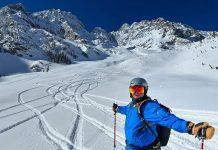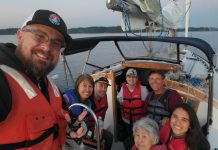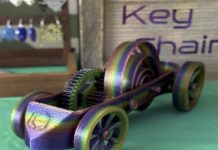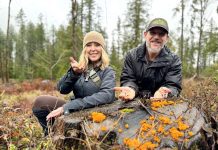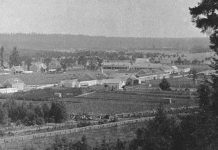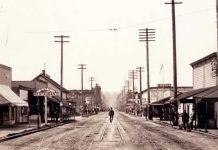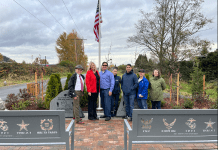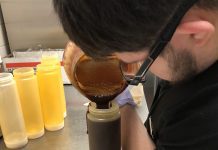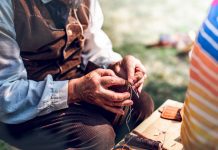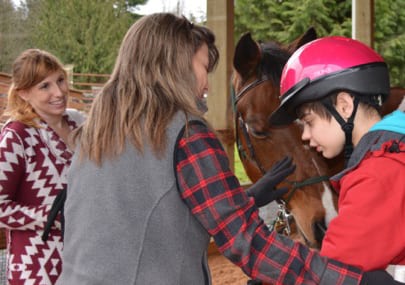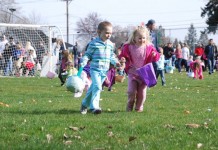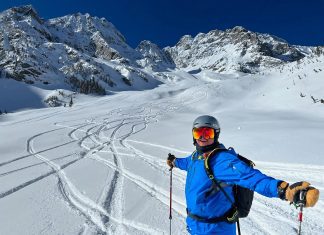By Mariah Beckman
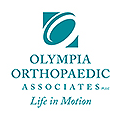 Laura places a hand on Whisper’s soft nose, no easy feat at just four-foot-seven-inches. She wears a helmet and a steady, subtle grin, as if she and this well-groomed quarter horse share a secret. Laura was born with a disability that makes it difficult for her to walk, which makes some activities and recreation challenging for her. Riding horses, however, is something she loves to do. The 38-year old is shy, until you ask her what horse she’s about to ride. She has plenty to say about her work with the horses at Changing Rein horse ranch in Graham.
Laura places a hand on Whisper’s soft nose, no easy feat at just four-foot-seven-inches. She wears a helmet and a steady, subtle grin, as if she and this well-groomed quarter horse share a secret. Laura was born with a disability that makes it difficult for her to walk, which makes some activities and recreation challenging for her. Riding horses, however, is something she loves to do. The 38-year old is shy, until you ask her what horse she’s about to ride. She has plenty to say about her work with the horses at Changing Rein horse ranch in Graham.
Laura and 50 other riders like her will learn about caring for and riding horses as part of this equine therapy program this month alone. The organization’s mission — to promote healing relationships through therapeutic horsemanship, equine assisted learning and equine assisted psychotherapy — has touched more than 100 lives like Laura’s since the program began in 2009. Each year the program sees a growing number of participants.
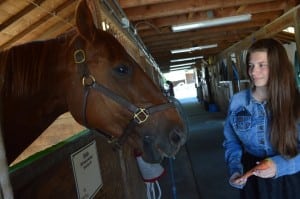
At Changing Rein, riders with Down syndrome, autism, spina bifida, cerebral palsy, developmental delay, epilepsy, learning disabilities, traumatic brain injury and many other physical, emotional and developmental challenges have found respite from their day-to-day struggles. For these young riders, spending time in the saddle with certified equine therapists is a learning experience, as well as a healing one.
Changing Rein is one of 850 institutions in the world that offers PATH-International member programs. There are other programs designed to focus on the needs of veterans, cancer survivors and the adults ages 65 and older in the state, but this particular organization places an emphasis on the goals of special needs children and at risk youth.
Therapeutic horsemanship, the program’s most prominent offering, teaches riding skills to those with special needs. Children ages 4 and older who struggle with mental, emotional or physical difficulties find a higher level of independence through the work at Changing Rein.
Children and families have been taking the reins in Graham since 2009 thanks to the architect of this rehabilitation program. Sandra Boe, Changing Rein Founder and Program Director, has worked in therapeutic horsemanship since 1999. She began as a local volunteer at another therapeutic riding program where she discovered for herself that therapeutic riding was not only helpful but also restorative.
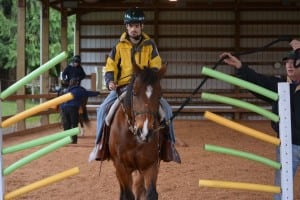
After Sandra was diagnosed with multiple sclerosis in 1998, her life changed dramatically. Always active and a lover of the outdoors, this mother of two found herself unable to move some days. After recovering from an aggressive attack, Sandra decided to return to her passion: working with horses.
It wasn’t long before every weekend working with horses became every day, and Sandra rekindled her longtime relationship with riding and showing horses. She was so taken with how curative her experience had been that she felt compelled to share opportunities like these with a community in need. “I definitely credit if not my recovery than my continued remission to working with these animals,” said Sandra.
She was drawn to the field, motivated by a desire to share the healing influence of an equine environment with others, particularly with children. Sandra says that working with children who are at-risk and others with special needs offers her a chance to share her lifelong love of animals with children who might not otherwise have the opportunity or inclination.
Sandra explains that horses share certain social responsive behaviors with humans. For this reason, it can be rewarding and even intuitive for patients to create a connection with the horse. Participation in programs like these foster problem solving, responsibility, boundary-setting, teamwork, communication, and leadership skills.
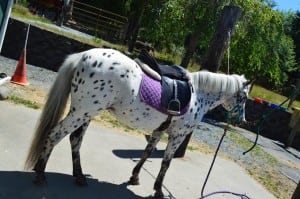
Because working with horses puts some at-risk riders outside of their comfort zone, Sandra finds that this sort of work also forces certain riders to open up and trust others. This makes the program effective for some children who are recovering from abuse or working through behavioral issues. Teens in particular are encouraged — and, Sandra finds, inclined — to discuss the thought process and problem-solving that led to their decisions in groundwork and therapeutic riding. Dialogue concerning these challenges help children improve language skills, listening skills, communication skills and even the ability to follow directions.
“There’s something about just being close to these animals and having them respond to you that is really rewarding,” says Jackie Berreth, Sandra’s business partner at Changing Rein. “Once you start riding and you become familiar with how to ride, the fact that this 1,000-pound animal is willing to do what you ask of it, to communicate and ride under your direction, is incredible no matter who you are.”
Their stature, beauty and power make horses naturally intimidating to many, which is why these majestic animals create a natural opportunity to overcome personal obstacles like fear or self-doubt. Studies have shown that equine therapy has a verifiable impact on the self-esteem, confidence and reasoning skills. Part of the reason that experts speculate equine therapy — or any animal therapy, for that matter — is so effective is because of the deficit of skills espoused by today’s society. Instant gratification is the standard in today’s plug-and-play culture, but working with horses requires physical and mental work and, more than that, patience.
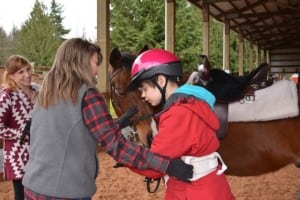
Ridership is only one way in which riders connect with horses. In some instances clients won’t lay hands on a horse at all; instead, young riders may be asked to set goals such as lead the horse to a specific location in the arena or outfit the animal with a saddle and harness.
The organization works with able-bodied riders, too, both in private lessons as well as in the public school system. Just this past school year, Sandra worked with a dozen Eatonville Middle School students in Changing Rein’s Hands on Horses program. The school district was very pleased with the results, reporting an improvement in attendance, social skills and the number of student infractions.
Program participants also saw an improvement in their grades and — best of all — an improvement in self-esteem. The campus performed an quantitative evaluation of the students before and after being involved in Hands on Horses and intends to return to Changing Reins this fall with 12 more students.
Youth and adults are welcome to volunteer at Changing Rein, which relies on the valuable donations of time and financial gifts as they continue to serve Pierce, Kitsap and Thurston county riders in need. Interested teens ages 14 and older can fill out a volunteer application online. Anyone wishing to make a donation of any kind are welcome to call, email or stop by the ranch to see the kind of vital work the organization is doing firsthand.
Changing Rein is located in northwest Graham. In addition to working with children who have special needs, the ranch also offers lessons to able-bodied riders and takes miniature horses on visits to nursing homes and assisted living facilities. Changing Rein hopes to soon offer a support group working with cancer patients and for those struggling with cancer.

